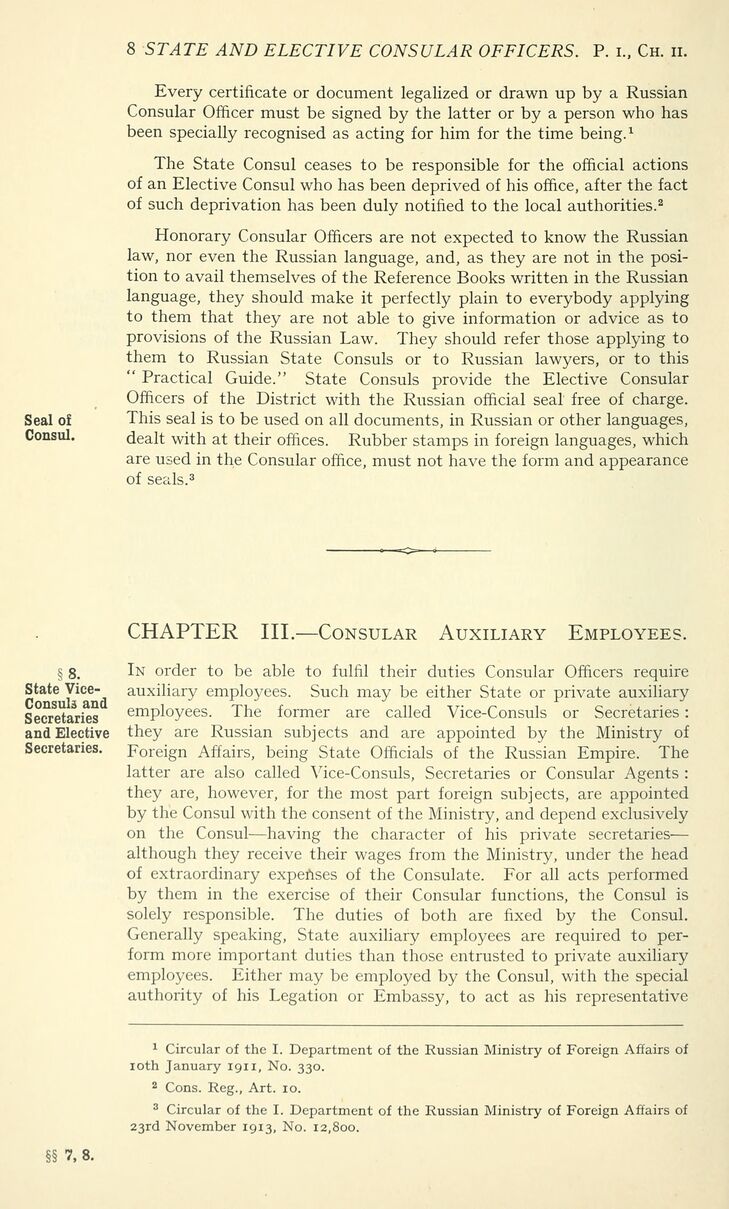
Full resolution (JPEG)
- On this page / på denna sida
- Chapter II. — State and Elective Consular Officers
- Chapter III. — Consular Auxiliary Employees

<< prev. page << föreg. sida << >> nästa sida >> next page >>
Below is the raw OCR text
from the above scanned image.
Do you see an error? Proofread the page now!
Här nedan syns maskintolkade texten från faksimilbilden ovan.
Ser du något fel? Korrekturläs sidan nu!
This page has been proofread at least once.
(diff)
(history)
Denna sida har korrekturlästs minst en gång.
(skillnad)
(historik)
Every certificate or document legalized or drawn up by a Russian
Consular Officer must be signed by the latter or by a person who has
been specially recognised as acting for him for the time being.[1]
The State Consul ceases to be responsible for the official actions
of an Elective Consul who has been deprived of his office, after the fact
of such deprivation has been duly notified to the local authorities.[2]
Honorary Consular Officers are not expected to know the Russian
law, nor even the Russian language, and, as they are not in the
position to avail themselves of the Reference Books written in the Russian
language, they should make it perfectly plain to everybody applying
to them that they are not able to give information or advice as to
provisions of the Russian Law. They should refer those applying to
them to Russian State Consuls or to Russian lawyers, or to this
" Practical Guide." State Consuls provide the Elective Consular
Officers of the District with the Russian official seal free of charge.
Seal of Consul.
This seal is to be used on all documents, in Russian or other languages,
dealt with at their offices. Rubber stamps in foreign languages, which
are used in the Consular office, must not have the form and appearance
of seals.[3]
| CHAPTER III. — Consular Auxiliary Employees. |
§ 8. State Vice-Consuls and Secretaries and Elective Secretaries.
In order to be able to fulfil their duties Consular Officers require
auxiliary employees. Such may be either State or private auxiliary
employees. The former are called Vice-Consuls or Secretaries:
they are Russian subjects and are appointed by the Ministry of
Foreign Affairs, being State Officials of the Russian Empire. The
latter are also called Vice-Consuls, Secretaries or Consular Agents :
they are, however, for the most part foreign subjects, are appointed
by the Consul with the consent of the Ministry, and depend exclusively
on the Consul—having the character of his private secretaries—
although they receive their wages from the Ministry, under the head
of extraordinary expenses of the Consulate. For all acts performed
by them in the exercise of their Consular functions, the Consul is
solely responsible. The duties of both are fixed by the Consul.
Generally speaking, State auxiliary employees are required to
perform more important duties than those entrusted to private auxiliary
employees. Either may be employed by the Consul, with the special
authority of his Legation or Embassy, to act as his representative
[1] Circular of the I. Department of the Russian Ministry of Foreign Affairs of
10th January 1911, No. 330.
[2] Cons. Reg., Art. 10.
[3] Circular of the I. Department of the Russian Ministry of Foreign Affairs of
23rd November 1913, No. 12,800.
<< prev. page << föreg. sida << >> nästa sida >> next page >>
Project Runeberg, Sat Dec 9 18:48:28 2023
(aronsson)
(diff)
(history)
(download)
<< Previous
Next >>
https://runeberg.org/consular/0028.html




